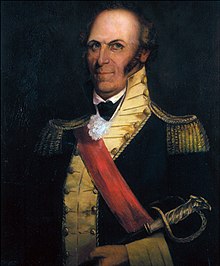Charles Scott (politician, 1739)
Charles Scott (* 1739 in Goochland County , Colony of Virginia , † October 22, 1813 in Clark County , Kentucky ) was a British- American politician and governor of the state of Kentucky.
Early years
The young Scott received a rather poor education. As early as 1755 he embarked on a military career. At that time he fought against the French and their Indian allies under the British General Edward Braddock . When the War of Independence broke out , he was in command of the first American company set up south of the James River . Soon he was promoted to brigadier general. He fought at Trenton and Germantown and was one of the last to leave the battlefield of Monmouth , New Jersey . Then he was captured by the British in South Carolina for two years.
In 1785 he settled in Woodford County in what is now Kentucky. In 1788 he became a member of a military committee that was supposed to take measures against the constant Indian raids. This committee included the future governor of Kentucky, Isaac Shelby . Until 1794 there were armed conflicts with different courses. Eventually the war ended in 1794 with a joint victory under General Anthony Wayne .
Kentucky governor
Scott had been politically active since 1789 when he was elected to the Virginia House of Representatives. There he remained until 1790. In 1808 he ran for the office of governor of Kentucky. With 61.3% of the votes cast, he prevailed against two competitors. His tenure was marked by emerging economic problems and the impending war with Great Britain, which actually broke out in 1812. The state's militia was increased by 1,400 soldiers in those years and placed under Major General William Henry Harrison . A fall in his first year in office meant Governor Scott had to rely on crutches for the rest of his life. Politically, too, he increasingly used the help of his State Secretary Jesse Bledsoe , who would later become a senator in Washington .
Old age and death
After the end of his tenure, he withdrew into private life. Scott was seen as a man of tenets. He was loyal to existing friendships and was adamant and stubborn towards his enemies. Sometimes he is also described as eccentric and impolite. Scott was married twice and had a total of seven children. He died in October 1813.
According to him, Scott County in Kentucky and Scott County named in Indiana.
literature
- Robert Sobel and John Raimo (Eds.): Biographical Directory of the Governors of the United States, 1789–1978. Vol. 2, Meckler Books, Westport, Conn. 1978. 4 volumes.
Web links
- Charles Scott in the National Governors Association (English)
- Charles Scott in the database of Find a Grave (English)
| personal data | |
|---|---|
| SURNAME | Scott, Charles |
| BRIEF DESCRIPTION | British-American politician and governor of the state of Kentucky |
| DATE OF BIRTH | 1739 |
| PLACE OF BIRTH | Goochland County , Colony of Virginia |
| DATE OF DEATH | October 22, 1813 |
| Place of death | Clark County , Kentucky |


